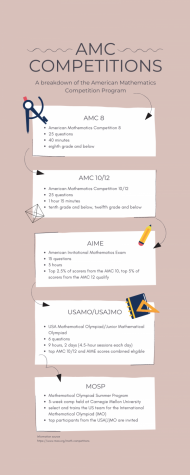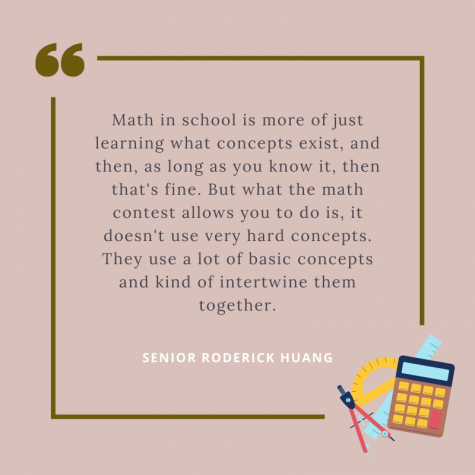Math
Exploring the preparation process for the AMC competitions and the differences between the remote and in-person exams
March 21, 2021

Senior Roderick Huang began his competitive mathematics journey in fourth grade, when his teacher required everyone in the class to participate in a math competition called the Math Olympiads for Elementary and Middle Schools (MOEMS). Huang recalls “that’s sort of the time I realized I’m pretty good at this, and I could also get better at these math competitions because they were like puzzles to me.”
After entering middle school, Huang began taking the American Mathematics Contest (AMC) exams, starting with the AMC 8 exam, a 25-question multiple choice exam administered to middle school students in 40 minutes. He also began preparing for the higher level AMC 10 and AMC 12 exams, which he would go on to take in high school. These allowed him to qualify for the American Invitational Mathematics Exam (AIME), which takes roughly the top 2.5% of AMC 10 scorers and the top 5% of AMC 12 scorers.
In order to study for the competition, Huang uses the Art of Problem Solving (AoPS) website, which provides previous AMC exams for practice. The website also serves as a meetingplace for math students, who can examine and discuss problems together. A few days before each exam, Huang looks through the forums to review theorems and other content that requires memorization.
“Leading up to the exam, I would mostly just do a lot of practice [exams],” Huang said. “The more problems you do, the better that you have intuition in doing newer problems. It doesn’t really matter where they come from, but the harder they are, the better. Sometimes I even do higher level problems to prepare myself for the lower contests. And then the day before, you’re supposed to just rest your mind, do other stuff, just relax. And then you compete the next day.”
In contrast, senior Parth Asawa, who has been taking AMC exams since fourth grade and has taken the AIME beginning in eighth grade, typically uses the day before the exam to squeeze in additional practice. As a senior with more experience taking the exam, Asawa recounts being more relaxed when he took the AMC 12 and AIME virtually this year.
Asawa also emphasizes the importance of time management when studying for the competitions, even when the exams are not coming up.
“It’s usually just working on math the night after you’re done with your homework, or you might be doing it during lunch or with your friends,” Asawa said. “There are a lot of different people at [MVHS] who do these competitions too, so you can find those groups there.”
Junior Grace Mao first heard about the AMC 8 from her friends, who were also interested in taking it. She took the AMC 8 all three years of middle school, then took the AMC 10 her freshman and sophomore year. This year, she took the AMC 12, administered virtually on Feb. 10 by AoPS.
Similar to Huang, Mao has also used the AoPS website to study, but in a different way. Over the past few years, Mao has taken in-person courses from the AoPS Academy to prepare for the AMC exams. However, after the pandemic hit and school transitioned online, Mao started to take online classes on the AoPS website.
Huang took the online AMC 12 this year, and cites that the 25-question, 75-minute structure has remained the same. He describes being monitored throughout the duration of the exam by a proctor through Zoom and believes that cheating was not a problem because of the nature of the exam.
“Since this is a math competition, it’s kind of fast; you have to solve every problem on average in three minutes,” Huang said. “And to be honest, for people doing math computations, you don’t really have time to cheat — it’s actually quicker to just do it by hand on the paper. It’s a very stressful one hour.”
Even though Mao believes there isn’t much of a difference between the online and in-person exams, she says she prefers the online version because of the familiarity of her surroundings and the lack of pressure without the presence of other test-takers.
In contrast, while Huang acknowledges the benefits of the online exam, such as the availability of a constant timer system newly enabled into the browser and a larger workspace, he still prefers to take the exam in-person.
“The questions are on the computer screen this time, and math is all written on paper,” Huang said. “A good example is geometric diagrams. Sometimes they’re given to you on the paper and then you can draw little notations, underline the problem. You can’t do that really on a computer. That was definitely one disadvantage.”
Huang suggests everyone give competitive math a shot, emphasizing the difference between the math in contests versus math in the school curriculum.

“Math in school is more of just learning what concepts exist, and then, as long as you know it, then that’s fine,” Huang said. “But what the math contest allows you to do is, it doesn’t use very hard concepts. They use a lot of basic concepts and kind of intertwine them together. For example, you look at a geometry problem, and you might think of geometric theorems, but hidden behind it, there’s a lot of algebra, and maybe even number theory sequences that you’re able to deduce from it.”
Mao agrees about the difference and believes that math in school is more repetitive because test questions will often reflect content from practice questions, while the problems in the AMC exams are more dynamic.
“The creators of the competition are really creative and they know how to make new problems every single year,” Mao said. “The questions for each year, they’re really different. There’s no pattern in them. I guess they do cover similar topics, but every year it’s not like they just change numbers in a column and you know the strategy of solving them. They change certain things that make the problems different. And so it’s really hard to figure out what strategies to use for a problem and you’re given very short time.”
While Huang prioritizes his responsibilities in school, he treats math competitions as “a very close second” and mostly studies for them on the weekends as opposed to weekdays.
“To some people, doing these math problems sounds like a pretty painful thing to do because you have to study stuff, but when you get to a certain level it’s kind of fun,” Huang said. “Because when you read these online forums and you learn these cool facts, they sometimes can relax your mind. It sometimes is like a pastime for me.”
Asawa has also discovered various benefits as a result of competitive math. For instance, through attending competitions, he has been able to meet like-minded peers and has found math to be much more collaborative than people think. He also stresses the knowledge he has gained from such competitions.
“I think the biggest thing about the AMC exams is people maybe characterize it as just a bunch of kids doing a math test, and that it’s not that fun,” Asawa said. “But I would say that the AMC exams are arguably very fun, [and] they’re also very helpful in that they develop problem-solving skills that are very in-depth and nuanced that are going to help you in whatever field you’re going into, probably more so if you’re going into a STEM field. The type of problem solving skills and intuition you build from studying for these AMC exams and also participating in them, that’s something that’s an invaluable thing you won’t ever lose.”

















